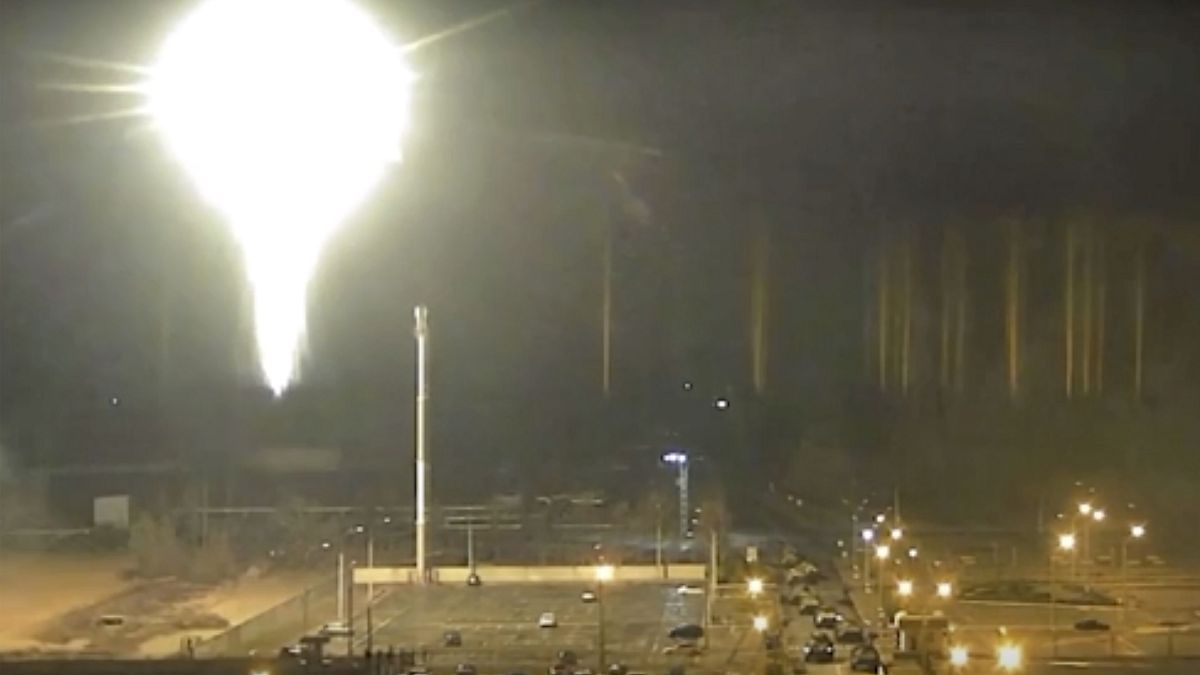Ukraine's president said Russia's tactics posed "threats to global security", while the head of the IAEA called the situation near the plant "extremely tense".
World leaders have condemned the Russian attack on a Ukrainian nuclear power plant which caused a major alert overnight, with Ukraine's president accusing Moscow of "nuclear terrorism".
Volodymyr Zelenskyy referred to "the gravity of threats to global security" after the Zaporizhzhia plant in southeastern Ukraine was hit by Russian shelling, as Vladimir Putin's forces continue their bombardment of Ukrainian infrastructure and cities.
The international nuclear authority says the plant, the largest in Europe, was hit by a "projectile" but none of the six reactors was struck, and there was no release of radioactive material.
Rafael Mariano Grossi, director-general of the International Atomic Energy Agency (IAEA), described the situation near the plant as still "extremely tense and challenging". He said on Friday that the surrounding territory was occupied by Russian troops but that Ukrainian plant operators were still in control of the reactor.
Ukraine’s state nuclear plant operator Enerhoatom said three Ukrainian soldiers were killed and two wounded in the attack.
The UN Security Council scheduled an emergency open meeting on the attack on Ukraine’s largest nuclear power plant on Friday, following a request from several countries.
'An attack against everyone'
In a new video appeal on Friday morning, President Zelenskyy called for an immediate reinforcement of Russian sanctions against Russia and for Russians to "take to the streets" to protest against Russian attacks on his country's nuclear plants.
NATO's Secretary-General Jens Stoltenberg said the shelling of the Zaporizhzhia nuclear plant "just demonstrates the recklessness of this war, the importance of ending it," calling on Putin to withdraw his troops from Ukraine.
The Russian attack brought a chorus of outrage from European leaders. Italian Premier Mario Draghi condemned the strike on the nuclear plant as "an attack against everyone".
Estonian Prime Minister Kaja Kallas said that "attacking nuclear facilities is a criminal act to terrorise the public". Latvian Foreign Minister Edgars Rinkevics on Twitter called the shelling "insane".
German Foreign Minister Annalena Baerbock accused the Kremlin of attacking its neighbour Ukraine with "undiminished force and brutality, carrying out wanton destruction, besieging entire cities and trying to grind down the civilian population".
Speaking ahead of a meeting of European Union foreign ministers in Brussels, Baerbock said efforts would continue to put political and economic pressure on Russian President Vladimir Putin and to isolate Russia for as long as the war continues.
"With his war against Ukraine (Putin) is also driving his own country into ruin," Baerbock said.
UK Prime Minister Boris Johnson said the Russian attack was "reckless".
IAEA concern for other nuclear plants
The IAEA's director general told his news conference on Friday that the shelling on the Zaporizhzhia plant hit a training centre "within the plant site" but that was "not part of the reactor".
The shelling sparked a fire that injured two security guards and was put out.
"All the safety systems of the six reactors at the plant were not affected at all", there was" no release of radioactive" material and that systems monitoring radiation "are fully functional as well," Rafael Mariano Grossi said.
Only one of the plant's six reactors was operating at 60% capacity, the others were either in "reserve mode" or not operating, he added.
Grossi, who tweeted earlier his deep concern about the attack, added that he had communicated with Ukrainian and Russian authorities offering to travel to Chernobyl and other nuclear power plants "so that these seven crucial pillars are never again compromised".
Overnight alarm over attack
The overnight Russian assault triggered phone calls between Ukrainian President Volodymyr Zelenskyy and British Prime Minister Boris Johnson, Canadian PM Justin Trudeau and US President Joe Biden; as well as German and Polish leaders. The US Department of Energy activated its nuclear incident response team as a precaution.
Trudeau described the attack on the nuclear facility "horrific" and "unacceptable" while Johnson said the Russian attack was "reckless".
As news broke of the attack, Ukraine's Foreign Minister Dmytro Kuleba warned on Twitter that if the plant blew up, the effect would be "10 times worse" than the Chernobyl nuclear disaster in 1986.
In an emotional speech in the middle of the night, President Zelenskyy said he feared an explosion that would be "the end for everyone. The end for Europe. The evacuation of Europe.”
“Only urgent action by Europe can stop the Russian troops," he said. "Do not allow the death of Europe from a catastrophe at a nuclear power station.”
Zelenskyy accused the Russians of deliberately targeting the plant's reactors using tanks with thermal imagine equipment.
In their phone conversation, Johnson and Zelenskyy agreed that Russia must immediately cease attacking and allow emergency services unfettered access to the plant, and that a ceasefire was essential, the UK prime minister's office said.
“The Prime Minister said the reckless actions of (Russian President Vladimir) Putin could now directly threaten the safety of all of Europe,” Johnson's office said in a statement. “He said (the United Kingdom) would do everything it could to ensure the situation did not deteriorate further.”
The United Nations Security Council meeting, to be held at 1630 GMT (1730 CET) Friday, was requested by the United States, United Kingdom, France, Ireland, Norway and Albania.


